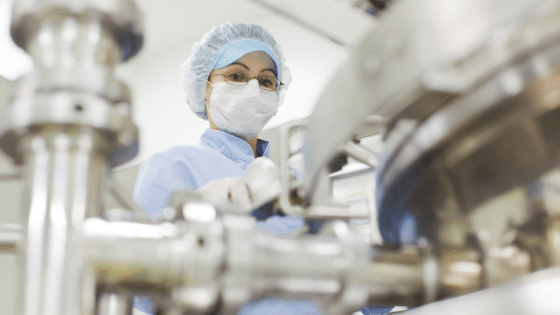Kloeckner Metals sells 1100 aluminum sheet, a commercially pure aluminum known for its superior formability, corrosion resistance, conductivity, and high weldability. Contact us today for a quote.

1100 aluminum, known as commercially pure aluminum, is the softest aluminum available. It has an excellent host of benefits and is a good use for many applications spanning several industries.
This alloy is part of the softest aluminum alloys but has excellent corrosion resistance and workability. It has high electrical conductivity and the highest thermal conductivity. Due to its softness, it is not used for high-strength or high-pressure applications.
1100 aluminum sheet is most common in the chemical and food and beverage industries.
It has excellent corrosion resistance and is therefore often used in chemical equipment, name plates, cooking utensils, decorative trim, and sheet metal.
It has excellent machinability, especially when it’s machined in hard temper.
This aluminum grade demonstrates good weldability.
Among a host of benefits, its excellent workability makes it a good fit for applications requiring advanced forming. This aluminum grade can be formed into many different shapes and forms through cold working.
It is not heat treatable.
This alloy is part of the softest aluminum alloys but has excellent corrosion resistance and workability. It has high electrical conductivity and the highest thermal conductivity. Due to its softness, it is not used for high-strength or high-pressure applications.
1100 aluminum sheet is most common in the chemical and food and beverage industries.
It has excellent corrosion resistance and is therefore often used in chemical equipment, name plates, cooking utensils, decorative trim, and sheet metal.
It has excellent machinability, especially when it’s machined in hard temper.
This aluminum grade demonstrates good weldability.
Among a host of benefits, its excellent workability makes it a good fit for applications requiring advanced forming. This aluminum grade can be formed into many different shapes and forms through cold working.
It is not heat treatable.
ANSWER:
Aluminum 1100 can be shaped into many different products and most frequently appears in railroad tank cars, fin stock, dials, cooking utensils, name plans, chemical equipment, dials, and more. The plumbing and lighting industries also make frequent use of 1100 aluminum sheet, in addition to many other industries.
ANSWER:
1100 aluminum is actually commercially pure aluminum, meaning it has 99.00% purity at a minimum. This gives it many of its benefits, including excellent corrosion resistance, workability, and weldability, in addition to high thermal conductivity.
ANSWER:
The main difference is that 3003 aluminum gets a 20% boost in strength over 1100 grade aluminum because of the addition of Manganese and Copper. While that seems like a lot, 3003 aluminum is still considered to have only moderate strength compared to other alloys.
ANSWER:
1100 aluminum is the softest grade of aluminum. It is soft and ductile and has excellent workability, making it ideal for applications with difficult forming. It can be welded using any method, but it is non heat-treatable
ANSWER:
Aluminum 1100 can be shaped into many different products and most frequently appears in railroad tank cars, fin stock, dials, cooking utensils, name plans, chemical equipment, dials, and more. The plumbing and lighting industries also make frequent use of 1100 aluminum sheet, in addition to many other industries.
ANSWER:
1100 aluminum is actually commercially pure aluminum, meaning it has 99.00% purity at a minimum. This gives it many of its benefits, including excellent corrosion resistance, workability, and weldability, in addition to high thermal conductivity.
ANSWER:
The main difference is that 3003 aluminum gets a 20% boost in strength over 1100 grade aluminum because of the addition of Manganese and Copper. While that seems like a lot, 3003 aluminum is still considered to have only moderate strength compared to other alloys.
ANSWER:
1100 aluminum is the softest grade of aluminum. It is soft and ductile and has excellent workability, making it ideal for applications with difficult forming. It can be welded using any method, but it is non heat-treatable
Between our global footprint, international transportation network,...
Steel base plates are fundamental elements employed in various manufacturing processes. These flat, rectangular...
Metal fabrication is a critical process that transforms raw metal materials into finished products....
The solar industry has undergone a significant transformation by incorporating steel products into various...
The unprecedented pace of solar growth is challenging and reforming America’s construction and engineering...
If you’ve got a roof over your head, it’s partly thanks to purlins. A...
Acquiring highly profitable company with annual sales of around USD 30 million Significant expansion...
A stainless steel depot is a specialized facility or supplier that stocks and provides...
American manufacturers use about 28.2 billion pounds of aluminum every year, 41.6% of it...
Leading steel distributor expands commitment to sustainability in the North American market. Kloeckner Metals,...
At Kloeckner, we are excited to announce that our Santa Fe Springs, CA location...

X
The Kloeckner Metals website uses modern technologies. Unfortunately, your browser doesn't support those technologies.
Download the latest version of one of these browsers to experience the site: